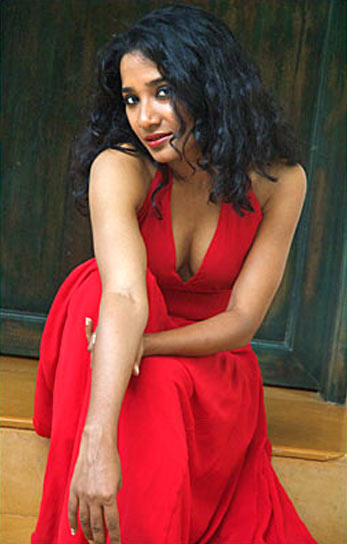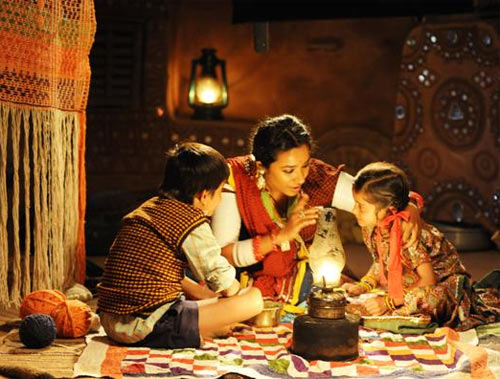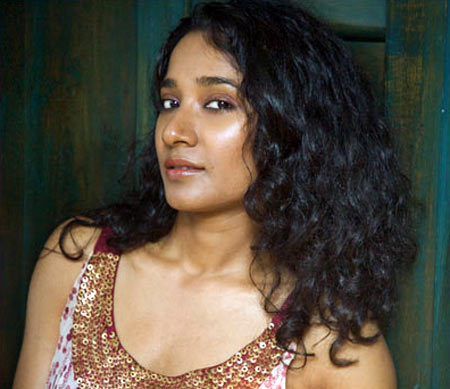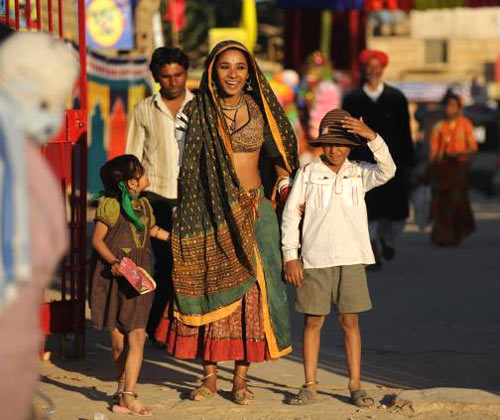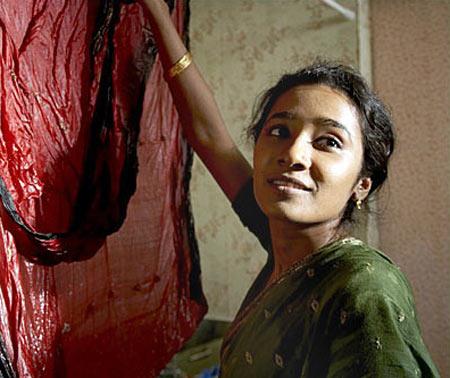 | « Back to article | Print this article |
'We have brought pornography to mainstream cinema'
Tanishtha Chatterjee is quite an unconventional actress, who has won crtical acclaim in films like Brick Lane and Road Movie.
Chatterjee recently won the Best Actress award at the New York Indian Film Festival for her film Dekh Indian Circus. The young actress plays a resilient mother and wife in a small village in Rajasthan.
In this interview with Sonil Dedhia, Chatterjee explains why she has stayed away from commercial Bollywood films.
What was your reaction when you learnt that you had won the Best Actress for your film Dekh Indian Circus at the New York Indian Film Festival?
The film was invited to almost all the film festivals but director Mangesh Hadawale chose where it should go. When the reviews started coming out, it was really overwhelming. New York and London are definitely the hubs of Indian audiences and New York critics.
Nawazuddin Siddiqui and I were both nominated in our individual categories but neither of us went to the awards ceremony because we were stuck doing something else.
Suddenly I got an SMS saying that not just I but also Nawaz has won an award, I was so excited that I called Mangesh who was in his village, happily farming with his cows and buffaloes (laughs).
The film got positive feedback at the Busan International Film Festival which is the biggest and the most prestigious Asian film festival. It won the Audience Choice award, which is a huge thing. I don't think any other Indian film has ever done that.
'We still need to educate our audience'
Do filmmakers participate in international film festivals so that they can market themselves better in India?
Yes, but there are a couple of things to consider. A film can go to any festival even if it is crappy because there are thousands of film festivals out there in the world.
But film festivals like Busan, Cannes, Berlin, Toronto, and Sundance are the top festivals and it is extremely difficult to be officially selected for these festivals.
Only 30 films are selected, so it's extremely prestigious to go to those festivals. Beyond that, it doesn't really matter.
In an earlier interview you mentioned that appreciation at the New York Indian Film Festival will help the film once it releases in India. Are films like Dekh Indian Circus still at the mercy of the festival tag?
I think sometimes it's the reverse because a lot of films that come from the B and C list festivals are extremely boring.
Films that have won the Palme d'Or in Cannes or the Golden Bear in Berlin have a certain level of professionalism and engagement which is very interesting to watch so they are not boring films.
We still need to educate our audience. We are all going towards pornography and cheap thrills and sadly that is where we are getting the maximum TRPs. I don't have anything against pornography but it should exist in its space. We have actually brought it into mainstream cinema. That's actually laughable and it doesn't happen in the West.
'As an actor I love working in all kinds of films'
A lot of films in Hollywood or even crossover cinema have shown India in a poor light. Is this just perpetuating the poor image of India in the West?
You have to understand one thing: When you live in metros, you only see 20 per cent of India. 70 per cent of our population is in the villages, not even in small towns. Even in urban centres most of the people live in slums.
Since we are so cocooned in our air-conditioned offices we don't notice. If I come back to India after a three-month stay in London, what is startling is the alarming number of poor people on the streets.
I think it shows our double standards that when a westerner comes and shows that (our poverty) to the world it doesn't go down well with us.
Somebody coming from the Scandinavian countries where there is 100 per cent literacy will surely be startled by the image of India.
You have stayed away from commercial Bollywood films. Is that deliberate?
As an actor, I love working in all kinds of films. I have just done a film with Sunny Deol and it can't get more commercial than that.
I think Bollywood is very important as it's an expression of the popular culture in our country today and you cannot disregard its influence on people.
A lot of times it is trashy, and a lot of times it is interesting. But having said that, in every country there are other avenues and outlets and you have to allow those voices as well because something really interesting might come out of it.
Sadly, in our country for the last 20 years we haven't allowed that. But the last two years have been interesting. A lot of alternative voices are reaching out to the masses and the audiences are embracing it like Paan Singh Tomar or Vicky Donor.
People are enjoying this cinema. It doesn't have to have big stars or songs or melodramatic stories.
'Being an eye-candy actress doesn't interest me at all'
Don't you think the kind of films you have chosen will put off makers of more commercial cinema from casting you in their films?
I don't think so. Whenever they need someone who also needs to be an actress, they will come to someone like me.
If they want eye-candy then it's a mutual repulsion. As a performer you've got to be responsible for the image that you portray. And being eye-candy actress doesn't interest me at all because I'm a trained actress.
There are a few Bollywood films that are coming to me which require an actress to be much more than just eye-candy.
You recently stated in an interview that the wrong kind of films and filmmakers are being promoted in India.
That's true. Even now it's not easy. Ask the alternative voices like Anurag Kashyap or even Mangesh how difficult it is to survive.
If we say Mira Nair is our filmmaker, she is not. She lives in New York, her funding comes from the west. She tells all sorts of stories and sometimes her films are on India too. She is just of Indian origin, that's all.
Satyajit Ray was never given recognition in our country. He became a big star here only after he got recognition by the French and the Americans.
Artists like Subodh Gupta, to whom India is waking up now, got recognition from the West. Read his interview where he states that nobody in India treated him well.
We are a very class-conscious society still. Not just in films but in every space. We celebrated women like Meena Kumari in the past and today we treat them like item girls. That's regression.
When I say we are promoting the wrong kind of filmmakers, I mean we have talented filmmakers like Amit Kumar and Mangesh who live here but Amit doesn't get a single person to fund his script here. He gets the money from the UK Film Council and when his film wins an award in Cannes, people say, okay, now we will fund his film.
'I am also doing a romantic comedy with Sunny Deol'
Freida Pinto, in one of her interviews, stated that she isn't playing just an Indian woman in Hollywood films. Do you think Indian actors in the West should not be confined to playing Indians only?
Why would they cast someone who is an Indian to do a role mean for Scarlet Johansson? She will do it better, right? Then, again, she can't be cast as a Bangladeshi woman, but I can be. She wouldn't be cast as an Arab woman, while an Iranian woman would do more justice to that role.
There is a physical limitation to acting that we have got to accept. But in a lot of US television, Indian faces are seen, as doctors, professors, journalists, scientists.
What are your future projects?
I am doing a film with Martin Sheen which is based on the Bhopal gas tragedy. Then there's Anna Karenina. I am very excited about that.
BMW (Bombay's Most Wanted) is a cop-gangster film from the woman's point of view. There are two lead protagonists in it -- a journalist played by Sarita Choudhary and a singer in a bar played by myself. I have 15 different looks in the film. It has Javed Jaffery, Chandan Roy Sanyal, Aadil Hussain of Agent Vinod fame and lots of other interesting actors.
Monsoon Shootout is also a cop-gangster film. Nawazuddin plays the gangster and I play his wife.
Then there's Gour Hari Dastan with Vinay Pathak, Konkona Sen Sharma and Ranvir Shorey.
I am also doing a romantic comedy opposite Sunny Deol. Kangna Ranaut is in the film too.
